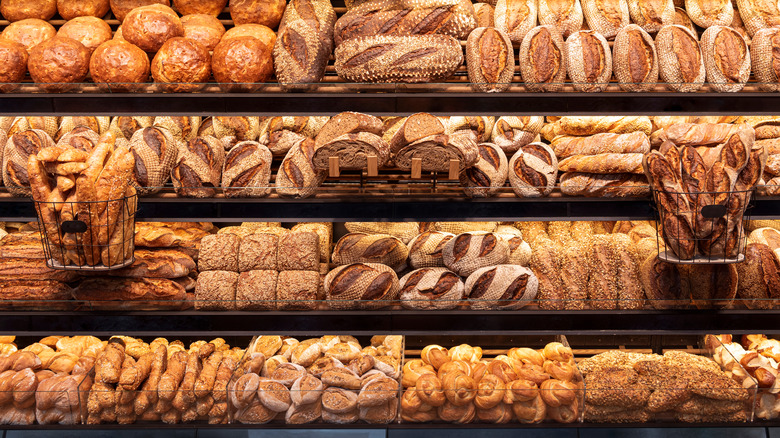When You Eat Too Much Bread, This Is What Happens
Bread has been a staple food in many countries around the world for thousands of years, but eating too much of it can potentially take a toll on your health (via Eat This, Not That). For instance, consuming an excessive amount of white bread can cause your blood sugar to spike.
"White sandwich bread is a refined grain, not a whole grain," registered dietitian Lori Zanini told Eat This, Not That. "When eaten as is, it has a high glycemic index and can directly lead to elevated blood sugar levels." This can increase your risk of type 2 diabetes.
Eating too much bread can also make you feel hungrier than usual. Since white bread is low in fiber and high on the glycemic index, consuming too much of it can actually increase feelings of hunger, which can cause you to overeat. As a result, eating too much bread may also cause you to gain weight and experience constipation.
How much is too much bread?
This doesn't mean that you have to completely give up bread for good, though. It just means you have to limit your bread intake and eat it in moderation (via Popsugar). But how do you know exactly how much bread is too much bread?
According to Paige Whitmire, a registered dietitian at One on One Fitness Consultants, figuring out how much bread you should eat isn't as simple as limiting yourself to a finite number of slices. In fact, it really depends on your own personal health and fitness profile. "You want to avoid eating too many carbs in one sitting," Whitmire told Popsugar. "It's about getting the proper portions of carbohydrates spread throughout the day at each meal and each snack but not too much at any one time. So with little bouts of fuel, you use it, get a little bit more, use it, and at no point does it spike your blood sugar or lead to weight gain."
Per MyPlate recommendations, grains, which are a source of complex carbohydrates, should make up 30% of your plate at every meal (via MedicineNet). Meanwhile, the Dietary Guidelines for Americans state that 45% to 65% of a person's total daily calories should be from carbs (per the Mayo Clinic). For example, in a 2,000-calorie diet, your daily carb intake should be between 225 and 325 grams per day. Naturally, this number can vary depending on how many calories you typically consume every day.


